The basic goal of the country's rural health sector has remained largely unmet. Its much-vaunted purpose: bringing health services to the doorsteps of villagers still faces a daunting challenge. Qualified doctors and nurses remain conspicuous by their absence at these centres, forcing patients to go to the nearby private doctors' chambers. Few can afford to do that owing to the expenses involved in visiting private practitioners. However, a tiny segment of these health complexes with obstetrics and gynaecological departments are found tolerably functioning.
As the pledged government health services remain elusive, the quacks are having their heyday. Both the print and electronic media remain replete with news of hazardous practices of the rural quacks. Apart from these phony doctors, there are the long-extinct herbal medicine practitioners and faith healers. Exorcists also do brisk business in remote areas in the cases of hysteria and similar diseases. Against this backdrop, reports of villagers losing their limbs in quackery are only natural. In the absence of properly equipped clinics within easy reach, critically ill poor rural patients turn to quacks. Treatment received from them is less costly than that from the qualified doctors in the towns. But due to the complications caused by antiquated and wrong treatment, the patients have to pay a heavy price. Although the luckier people can escape physical harm, many cannot. Owing to pervasive ignorance and poverty, these quacks generally get away with their act. Lax enforcement of preventive laws also aggravates the situation.
The government-run health service apart, the private sector doesn't offer any better look. Beside the erratic price hike of life-saving drugs, their artificial crisis, sale of spurious medicines etc, few pharmacies in semi-urban areas meet the basic prerequisites for running such outlets. Pharmacies in the rural area nowadays present a dismal look in general. Many of them operate without even compounders, let alone meet the provision for appointing a pharmacist with expertise in selecting the right medicines. In many cases, the shop-owners themselves play a proactive role in picking medicines from the shelves. They are found recommending to the evidently ignorant clients different medicines other than those prescribed. It points to the alarming extent of insensitivity to which the medicine sellers have stooped.
A similar situation prevails at pharmacies across the cities as well. Buying drugs over the counter is an added element here. Purchase of exclusive medicines without prescriptions occupies a major place in the list of many irregularities at urban pharmacies. Taking wrong medicines and doses as per hurriedly written prescriptions by doctors can lead to terrible health hazards. Few pharmacies in the cities are aware of the prerequisite of appointing qualified pharmacists. It's only them who can greatly help patients avert hazardous consequences of taking wrong medicines. On account of many surveillance activities, any headlong decline in the urban areas can be reined in. But the rural health sector can in no way be left in the lurch.


